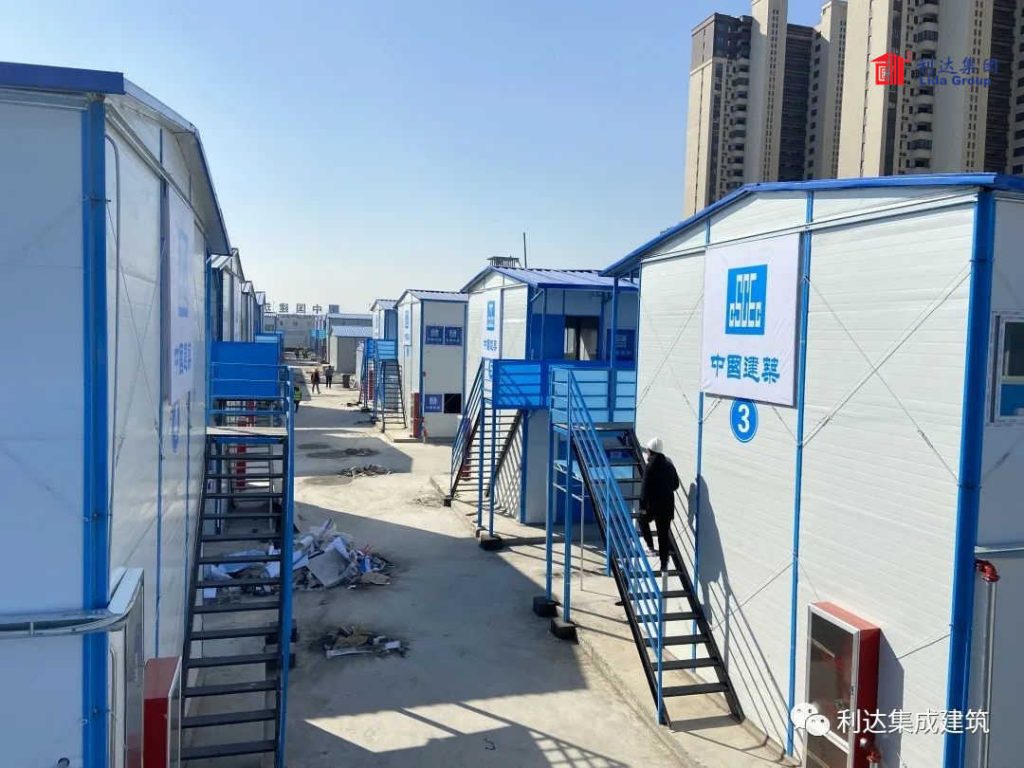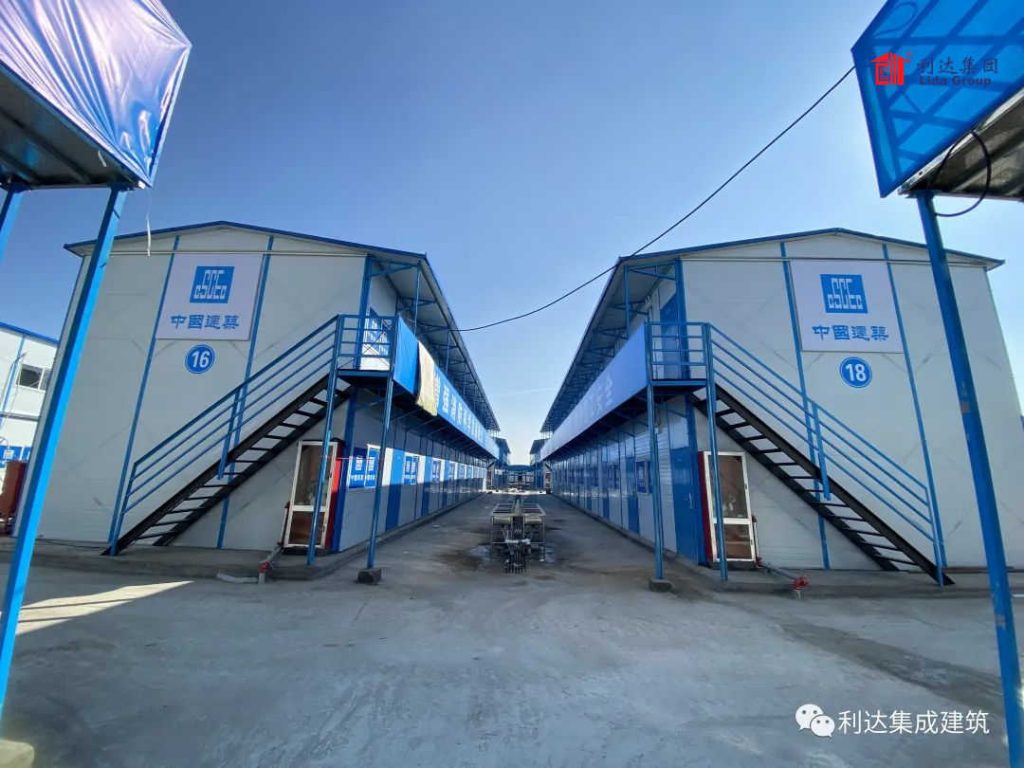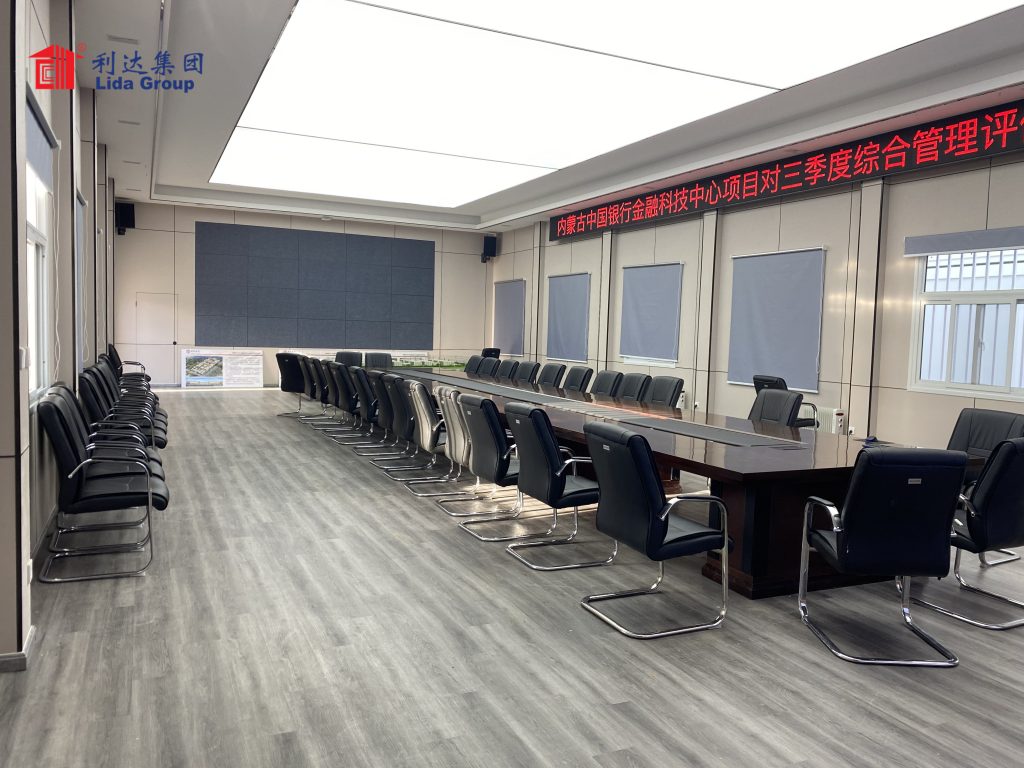Brand Name: Lida
Material: Prefabricated house
Use: Prefab House
Certificate: CE (EN1090), SGS ,BV, ISO9001, ISO14001, ISO45001
Delivery time: 15 to 30 days
Payment Terms: T/T, LC
Brand Name: Lida
Material: Prefabricated house
Use: Prefab House
Certificate: CE (EN1090), SGS ,BV, ISO9001, ISO14001, ISO45001
Delivery time: 15 to 30 days
Payment Terms: T/T, LC
Introduction: Understanding the Concept of Sandwich Panel Houses
In today’s world, where efficiency and sustainability are becoming increasingly important, the concept of sandwich panel houses has gained significant attention. These prefabricated buildings, also known as modular construction or prefab homes, offer a new and innovative approach to housing that combines convenience, energy-efficiency, and sustainability.
Sandwich panel houses are constructed using panels made of two layers of material with an insulating core in between. This unique design provides excellent thermal insulation properties, making these homes highly energy-efficient. As a result, homeowners can enjoy reduced energy consumption and lower utility bills while minimizing their carbon footprint.
One of the key advantages of sandwich panel houses is their prefabricated nature. The panels are manufactured off-site in a controlled environment before being transported to the construction site for assembly. This streamlined process not only reduces construction time but also minimizes waste and environmental impact.
Moreover, these modular homes offer flexibility in design and layout. They can be customized to meet individual preferences and requirements while maintaining structural integrity and durability.
As we move towards a more sustainable future, sandwich panel houses present an attractive solution for those seeking environmentally-friendly housing options. By combining energy-efficiency with modular construction techniques, these homes provide comfortable living spaces that contribute towards reducing our ecological footprint.
In this section, we will delve deeper into the concept of sandwich panel houses, exploring their benefits, use cases, and potential impact on the future of sustainable housing.
1. Cost-effectiveness and Time Efficiency:
In today’s fast-paced world, where cost-effectiveness and time efficiency are of utmost importance, the construction industry is constantly seeking innovative solutions. One such solution that has gained significant traction is the concept of cost-effective housing through time-efficient construction methods, particularly through the use of prefab buildings.
Prefab buildings offer tremendous cost savings compared to traditional construction methods. By utilizing pre-manufactured components and streamlined processes, developers can significantly reduce material waste and labor costs. This not only makes cost-effective housing more accessible to a wider range of individuals but also allows for faster project completion.
The time efficiency aspect of prefab buildings is another key advantage. With traditional construction, delays due to weather conditions, shortage of skilled labor, or other unforeseen circumstances can significantly impact project timelines. In contrast, prefab buildings are constructed in a controlled factory environment, minimizing these external factors and ensuring consistent progress.
The combination of cost-effectiveness and time efficiency makes prefab buildings an attractive option for both developers and homeowners alike. The ability to save on construction costs while enjoying faster project completion translates into tangible benefits such as reduced financial burden and quicker occupancy.
As the demand for affordable housing continues to rise globally, the utilization of prefab buildings provides a viable solution that addresses both economic and temporal constraints. By embracing this innovative approach to construction, we can pave the way for a more sustainable future where cost-effective housing is readily available without compromising quality or timeliness.

2. Energy Efficiency and Sustainability:
In today’s world, where sustainability and energy efficiency are becoming increasingly important, the construction industry is embracing new technologies and practices to create a greener future. Energy-efficient homes and sustainable prefab buildings are at the forefront of this movement, promoting environmentally conscious living while reducing our carbon footprint.
Energy-efficient homes are designed to minimize energy consumption by utilizing innovative insulation materials, smart home technology, and renewable energy sources such as solar panels. These homes not only reduce utility bills but also contribute to a healthier environment by reducing greenhouse gas emissions.
Prefab buildings take sustainability a step further by incorporating green construction materials into their design. These materials are sourced responsibly and have a lower environmental impact compared to traditional building materials. Additionally, prefab construction reduces waste generation on-site and allows for efficient use of resources.
By embracing energy-efficient homes and sustainable prefab buildings, we can make significant strides towards creating a more sustainable future. Not only do these structures promote eco-friendly living but they also provide comfortable and modern spaces for individuals and families.
Investing in energy-efficient homes and sustainable prefab buildings is not just beneficial for the environment; it also offers long-term cost savings through reduced energy consumption. Furthermore, these structures often have higher resale value due to their desirable features in an increasingly environmentally conscious market.
In conclusion, the focus on energy efficiency and sustainability in construction is vital for addressing climate change and ensuring a brighter future for generations to come. Embracing energy-efficient homes and sustainable prefab buildings not only benefits us individually but also contributes to the greater good of our planet. Let us be proactive in adopting these practices as we move towards a more environmentally friendly approach to construction.
3. Versatility in Design and Customization:
The versatility of sandwich panels in design and customization offers endless creative architectural possibilities. These innovative building materials provide architects and designers with the flexibility to create unique structures that meet both aesthetic and functional requirements.
One of the key advantages of sandwich panels is their design flexibility. They can be easily molded into various shapes, allowing architects to experiment with unconventional designs and push the boundaries of traditional construction methods. Whether it’s curved walls, intricate facades, or geometric patterns, sandwich panels offer the freedom to bring imaginative architectural visions to life.
Furthermore, sandwich panels are highly customizable, making them an ideal choice for prefabricated houses. With a wide range of finishes, colors, and textures available, homeowners can personalize their homes according to their preferences. From sleek modern designs to rustic or industrial aesthetics, sandwich panels can be tailored to suit any style or theme.
In addition to their design versatility, sandwich panels also offer practical benefits such as energy efficiency and durability. Their insulation properties help regulate indoor temperatures and reduce energy consumption, while their lightweight yet robust structure ensures long-lasting performance.
In conclusion, the use of sandwich panels in architectural design allows for unparalleled creativity and customization. From striking facades to fully customizable prefabricated houses, these versatile building materials empower architects and homeowners alike to create spaces that are not only visually appealing but also efficient and durable.

4. Durability and Structural Integrity:
When it comes to choosing a housing solution, durability and structural integrity are key factors to consider. Sandwich panel houses have gained popularity due to their impressive durability and longevity.
These houses are designed to withstand various environmental factors, making them an ideal choice for different climates and locations. Whether it’s extreme heat, cold, humidity, or even seismic activity, sandwich panel houses have proven their resistance.
The secret lies in the construction materials used. Sandwich panels consist of two layers of durable material with a core layer that provides insulation and strength. This unique composition ensures that the house remains structurally sound over time.
Additionally, sandwich panel houses are known for their resistance to moisture and corrosion. The materials used in these panels are specially treated to prevent water penetration and damage from environmental elements such as rain or snow.
Moreover, these houses offer excellent thermal insulation properties, keeping the interior comfortable regardless of external temperatures. This not only enhances the living experience but also contributes to energy efficiency.
In conclusion, if you prioritize durability and structural integrity in your housing choice, sandwich panel houses are an excellent option. Their resistance to various environmental factors ensures long-lasting quality without compromising on comfort or energy efficiency.
5. Portability and Easy Installation:
Portability and easy installation are two key factors that make portable prefab houses and relocatable buildings an attractive option for many individuals and businesses. These innovative structures offer the flexibility to be easily transported and set up in various locations, providing a convenient solution for those who require temporary or mobile accommodations.
One of the main advantages of portable prefab houses is their ease of installation. Unlike traditional construction methods that can be time-consuming and labor-intensive, these prefabricated structures are designed to be quickly assembled on-site. With pre-cut components and streamlined construction processes, the installation time is significantly reduced, allowing for faster occupancy and reduced disruption to the surrounding environment.
Furthermore, the portability aspect adds another layer of convenience. Portable prefab houses can be easily disassembled and relocated to a new site whenever needed. This flexibility makes them ideal for individuals or businesses that require temporary housing solutions or frequently move locations.
Whether it’s for residential purposes such as vacation homes or emergency shelters, or commercial applications like pop-up stores or remote workstations, portable prefab houses offer a versatile solution that combines ease of installation with the ability to adapt to changing needs. Their portability and easy installation make them an appealing choice for those seeking efficient and flexible building options.

Conclusion: Embrace the Future of Construction with Sandwich Panel Houses
In conclusion, embracing the future of construction with sandwich panel houses is a wise and forward-thinking decision. These innovative building materials offer numerous benefits that cannot be ignored.
Sandwich panel houses provide exceptional thermal insulation, ensuring energy efficiency and reduced utility costs. They are also highly durable, resistant to fire, moisture, and pests, making them a long-lasting investment.
Furthermore, sandwich panel houses are constructed using prefabricated panels, allowing for faster and more efficient construction processes. This not only saves time but also reduces labor costs significantly.
In addition to their practical advantages, sandwich panel houses offer endless design possibilities. They can be customized to suit various architectural styles and preferences, providing homeowners with unique and aesthetically pleasing living spaces.
By embracing the future of construction with sandwich panel houses, we can contribute to sustainable building practices. These eco-friendly materials minimize waste during production and have a lower carbon footprint compared to traditional construction methods.
In conclusion, the future of construction lies in the utilization of sandwich panel houses. Their numerous advantages in terms of energy efficiency, durability, cost-effectiveness, design flexibility, and sustainability make them an ideal choice for modern construction projects. Embrace this innovative solution today and unlock a world of possibilities in the realm of architecture and housing.

Our team will use our experience to provide the professional services .
